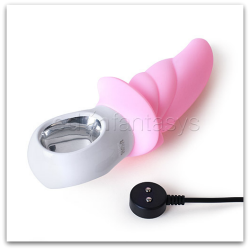Whatever you use in the bedroom, from lubricants to condoms to adult toys, do your part to make sure they are made from products that are safe for your body and the earth. Be aware of what you are putting near your nether parts and avoid dangerous liaisons with products that contain potentially harmful ingredients.
What’s in a Lube?
Consider lubrication, the most common enhancement aid used. Surveys suggest that over 40% of women will use lubrication at some point in their lovemaking. Lubrication is used more than any other adult item to enhance lovemaking. From a woman’s needs, that is because vaginal dryness is one of the most common complaints, and can be brought about by any number of things including childbirth, hormones, medical conditions and aging.
Vaginal lubricants are
water-based,
oil-based, or
silicone-based, and each kind offers pros and cons. However and regardless of brand, some include ingredients that are potentially risky.
“Ninety percent of the OTC lubes available are made with chemicals designed first for cars or oven cleaner,” explains one veteran and founder of a company dedicated to making safe lubricants. “Many women have severe reactions to these ingredients and believe the problem is with them and not the products they are using.”
It’s not just that untested or harmful products are still ubiquitous in some personal hygiene products. Your skin can absorb these toxins up to eight times faster than if you’d ingested that compound orally.
Compounds to avoid include, but are not limited to the following: Any benzene derivatives such as sodium benzoate, methyl, ethyl and propylparaben, and benzoate of soda. Boric acid, salicylates and cinnamic aldehyde (an ingredient used in ‘hot’ lubricants) can also be problematic.
Green Your Sex Toys
When shopping for something that’s intimate and sustainable – better for you and the planet – look for products made with eco-safe materials. These include annealed glass, silicone, stainless steel, Lucite, ceramic or hypoallergenic thermoplastic elastomer. Avoid phthalates or PVC-based products (they often have a stronger smell, a possible giveaway), compounds used to make toys squishier.
Old-fashion batteries are a green No-No; better options include rechargeable batteries, something that uses a charging base, or a toy that is solar-powered.
Finally, think about biodegradability: Silicone and Lucite don’t decompose, but they are recyclable. Glass goodies are also recyclable, and the production is relatively nontoxic. Word of caution though: don’t drop them. This can result in fractures, making your glass toy something you don’t want to play with.
Be-You-T-Full and Green
Finally, as an added benefit, consider greening your beauty and hygiene rituals (which can be considered part of foreplay!) Why? It turns out that lovers may not realize that the culprit for their malaise lies in the personal products, including vaginal lubricants.
For example, rash, fatigue, coetaneous skin lesions, internal lesions, nerve degeneration, thrush and Candida infections, inflammation, and malign are known reactions associated with some environmentally un-friendly compounds (Say yuck three times fast!).
Going green is about increasing pleasure in ways that benefit body, mind, and soul. As an added benefit, it’s nicer to the planet. Simply put, smart lovers have great sex, naturally. When it comes to romancing your beloved this year, go green. It’s the new way to shower your lover with red-hot passion.




My sentiments exactly. Others think im crazy for not being traditional, but hey, we can all start our own traditions
really enjoyed this